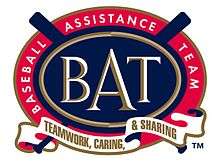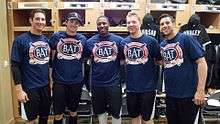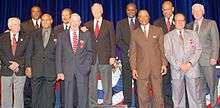Baseball Assistance Team

The Baseball Assistance Team is a 501(c)(3) non-profit affiliated with Major League Baseball. The organization's stated goal is to "help members of the Baseball Family who have come on hard times and are in need of assistance," and is guided by the principles of teamwork, caring, and sharing.[1] The baseball family includes former players, both from the Major and Minor Leagues, former Negro League players, umpires, scouts, and MLB and MiLB team personnel. B.A.T. recognizes that "events and circumstances can become difficult and trying when the cheering ends," and aims to alleviate medical, financial, or psychological hardships faced by members of the Baseball Family.[2]
History
The Baseball Assistance Team was founded in 1986 during the term of Commissioner Peter Ueberroth as a way for Major League Baseball and its players to take care of former players who have fallen upon hard times. Eligibility for help from B.A.T. has since been expanded to include those with two years of service as Major League and Minor League front office personnel, umpires, scouts, Minor League players, athletic trainers, former Negro League baseball players, women from the Women’s Professional Baseball League, and their widows, widowers, and children under the age of 23. B.A.T. has also worked hard to expand its efforts into Latin America where they have provided help to players coming mostly from Puerto Rico, the Dominican Republic, and Venezuela. This organization was founded with the goal of helping members of the Baseball Family during times of hardship, not as a long term program but as a bridge to get people back on their feet and self-sufficient without losing pride or dignity. In 1991, a contribution from Major League Baseball, the Major League Baseball Players Association, and the Freedom Foundation established an endowment for B.A.T. While B.A.T. was not, and is not, meant to be a substitute for a pension or retirement savings, it is able to prevent eviction, cover emergency medical bills, or provide for household expenses in a time of need.
Fundraising
Major League Baseball provides for the overhead expenses of the Baseball Assistance Team, including salary and travel expenses, which allows every penny raised to be donated to a grant recipient. B.A.T. raises the money it uses to help members of the Baseball Family in a number of ways.[3] To date, B.A.T. has provided over 3400 grants totaling over $32 million in assistance.

Spring Training Visits
The annual B.A.T. Spring Training Fundraising Tour is another major endeavor for B.A.T. Since 2003, members of B.A.T. have visited each team in Major League Baseball and solicited donations, all of which are given back to former players and members of the Baseball Family in need. Through the payroll deduction program, players and coaches can pledge a portion of their salary to B.A.T. which goes directly to the grants.[4] Most importantly, the visits also educate the players to be the eyes and the ears of B.A.T. by notifying the organization about anyone who may be in need of assistance. This year, the tour generated $2.8 million in donations pledged by 1,600 players, shattering all-time B.A.T. records in both categories.[5] The teams that donate the most money to B.A.T. are honored each year with the Bobby Murcer Award. The 2016 Bobby Murcer Award recipients are the Arizona Diamondbacks and the Detroit Tigers. This is the second consecutive year for the Tigers and the second win for the Diamondbacks (also in 2012).[6]
Awards
Big B.A.T./Frank Slocum Award
The Frank Slocum Big B.A.T. Award,[7] named for the first director of the Baseball Assistance Team, is given to “an individual or a group of individuals whose exemplary service to B.A.T. has helped provide dignity and self-esteem to members of the Baseball Family." The 2016 award was presented to Jake Peavy of the San Francisco Giants.[8][9] Past award winners include Commissioners Bud Selig, Peter Ueberroth and Fay Vincent as well as Bob Costas, Bob Uecker, Ozzie Smith, George Brett, the late George M. Steinbrenner, Don Zimmer, Bob Watson, Brad Lidge, and Adam Jones.
Bart Giamatti Award
The Bart Giamatti award is given to the “individual associated with baseball who best exemplifies the compassion demonstrated by the late commissioner.” Generally, it is given to a player involved in a wide range of charity work, benefitting both those involved with the game of baseball and those in the community at large. At the 2012 Going to Bat for B.A.T. dinner, the Bart Giamatti Award was given to Carlos Beltran of the New York Mets. Previous winners include CC Sabathia of the New York Yankees, Cal Ripken, Jr., Ken Griffey, Jr., Derek Jeter, Al Leiter, Don Mattingly, Tom Glavine, Jorge Posada, and Tim Wakefield.
Bobby Murcer Award
The Bobby Murcer Award, named in honor of late Yankee great and B.A.T. Chairman Bobby Murcer, is presented to the team from each league that donates the most money during the annual B.A.T. Spring Training Fundraising Tour. The teams that will be presented the award for their contributions during the 2016 Spring Training Tour are the Arizona Diamondbacks of the National League and the Detroit Tigers of the American League. This is the second win for the Arizona Diamondbacks and the second consecutive year the Tigers have been the recipients of the award.[10]
Hall of Fame Support

In addition to being supported by players from every club in Major League Baseball, the Baseball Assistance Team enjoys a significant amount of support among members of the Baseball Hall of Fame. Present at the 2011 Going to BAT for B.A.T. dinner were Hall of Famers Hank Aaron, Roberto Alomar, Rickey Henderson, Luis Aparicio, Jim Palmer, Billy Williams, Goose Gossage, Earl Weaver, and Dick Williams.
Leadership
Board of Directors
- President: Randy Winn
- Vice President: Bob Watson
- Members: Steve Garvey, Luis Gonzalez, Adam Jones, Alan Nahmias, Sal Bando, Dick Freeman, Raúl Ibañez, Mark Letendre, Diane Margolin, Buck Martinez, Christine O'Reilly, Staci Slaughter, Gary Thorne, and Greg Wilcox[11]
- Director: Erik Nilsen
Currently, Erik Nilsen serves as the Director of B.A.T. Under his direction, B.A.T. continues to educate members of the Baseball Family about the B.A.T. mission, fundraise, and ensure the organization is reaching and assisting as many members of the Baseball Family in need.
References
- ↑ http://mlb.mlb.com/mlb/official_info/community/bat_history.jsp
- ↑ http://mlb.mlb.com/mlb/official_info/community/bat_history.jsp
- ↑ http://mlb.mlb.com/mlb/official_info/charity/index.jsp
- ↑ http://m.mlb.com/news/article/3819502/
- ↑ http://www.mlb.com/news/press_releases/press_release.jsp?ymd=20100330&content_id=9015576&vkey=pr_mlb&fext=.jsp&c_id=mlb
- ↑ http://www.mlbcommunity.org/programs/baseball_assistance_team.jsp?content=spring_training_fundraising_tour_2016
- ↑ Frank Slocum Big B.A.T. Award (1998–present). Baseball-Almanac. Retrieved 2011-08-19.
- ↑ http://m.mlb.com/video/topic/31426364/v544357383/peavy-receives-2016-bat-award-for-charitable-work
- ↑ http://jakepeavyfoundation.org/news.php
- ↑ http://www.mlbcommunity.org/programs/baseball_assistance_team.jsp?content=spring_training_fundraising_tour_2016
- ↑ http://web.mlbcommunity.org/programs/baseball_assistance_team.jsp?content=contacts
External links
- Baseball Assistance Team. MLB Advanced Media, L.P.
- Former Chicago Cubs Bullpen Catcher Sees Benefits when Money from Fines Goes to Charity. ESPN.com